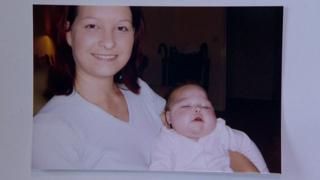
Abbie died aged 17 months in 2006 after being left with life-limiting injuries after her birth
The trust at the centre of an investigation into a cluster of baby deaths during labour was warned a decade ago that its maternity services had to improve.
In 2007, the NHS regulator told the Shrewsbury and Telford hospital trust there were issues with the way it carried out foetal heart monitoring.
The health secretary has ordered an investigation into seven baby deaths between 2014 and 2016.
The trust has apologised unreservedly.
Five of the baby deaths were contributed to by failures to monitor or analyse foetal heart rates, according to coroners’ reports and legal admissions by the trust.
Baby death cluster: Jeremy Hunt orders investigation
The families’ stories: ‘Doctors ignored me – my girls are gone’
The regulator in 2007, the Health Care Commission, became involved at the Royal Shrewsbury Hospital after a number of families started legal action following problems at the maternity unit.
Two families in particular had children born with brain injuries in 2004 and 2005 after problems with foetal heart monitoring.
‘I was more carer than mother’
Kerry Luke told BBC News that staff at the hospital had failed to act on a heart monitor reading indicating her daughter was in distress.
Abbie was eventually delivered by emergency caesarean section. She was resuscitated but was left with life-limiting injuries.
“She had severe epilepsy and cerebral palsy,” said Kerry.
“She couldn’t suck or swallow. She was very dependent on me – she was fed through a tube and continually on medication.
“I was more her nurse and carer than her mother.”
Abbie died peacefully in 2006, aged 17 months.
Abbie could not suck or swallow after she was resuscitated following her birth
Following a review into her care, and other cases, the Health Care Commission made a number of recommendations to the hospital:
- To keep an audit of CTG (foetal heart) monitor traces and send the latest CTGs to the commission so improvement could be regularly identified
- Revise staff training programmes, which were deemed to be lacking or inappropriate, particularly in relation to emergency situations
- Improve how staff learned from clinical incidents and how accountable staff were for errors
- Strengthen its clinical governance
- Consider appointing a full-time clinical risk adviser for children and maternity
Despite the advice, the problems continued.
Of the seven avoidable baby deaths between September 2014 and May 2016, five of them were contributed to by failures to properly read or analyse the baby’s heart rate.
“It’s disgusting,” said Kerry. “They should have learned from their mistakes. Why is this still happening?”
Bitter blow
The successor to the Health Care Commission, the Care Quality Commission (CQC), carried out an inspection of the trust seven years later, in 2014.
Despite ongoing problems, including a lack of shared learning from maternity incidents and no evidence of extra training in foetal heart monitoring or cardiotocography (CTG), the CQC report rated maternity at the trust as “good”.
Asked by the BBC what it had done to follow up the regulator’s advice in 2007, the CQC was unable to find any evidence that any action had been taken.
A CQC spokeswoman said: “This (warning) relates to 10 years ago and a different organisation. The case that the HCC had not protected patients in the way it should have done has already been made and accepted.”
She added that the regulator had issued a Compliance Action to the trust following their 2014 findings to ensure all staff reported and learned from incidents.
Image copyright
Katie Anson
The coroner said the trust had failed to classify Kye Hall’s mother as a high-risk pregnancy or listen to his heartbeat
For the parents of Kye Hall, the news that the trust had been warned a decade ago about its maternity services is another bitter blow.
Kye died when he was four days old in 2015.
A coroner found his death had been “caused or contributed to” by the trust which had failed to classify his mother as a high-risk pregnancy or to listen to Kye’s heart rate.
“It makes me angry, but it makes me sad as well,” said Kye’s mother Katie.
“To think of all the people who’ve lost their children because they haven’t done anything, they haven’t acted. You feel robbed.”
The investigation ordered by Health Secretary Jeremy Hunt will be led by Kathy McLean, medical director at NHS Improvement.
NHS Improvement has said that if any families have concerns about deaths or other maternity errors at the trust they should contact them on 0203 747 0900.
‘Tragic deaths’
The BBC asked the Shrewsbury and Telford Hospital NHS Trust to give details of the actions it had followed after the HCC issued its warnings back in 2007.
But it has not provided any evidence of actions it has taken.
Instead, the trust’s chief executive Simon Wright said in a statement: “The loss or serious injury of a baby is the most terrible event imaginable and we again apologise unreservedly to the families involved.
“The trust has carried out investigations into every case to ensure that lessons can be learned and apologise where feedback has been less than a family may wish.
“We are co-operating fully with the review that the Secretary of State has asked NHS England and NHS Improvement to perform to look into the robustness and effectiveness of our investigations into these tragic deaths.
“It would not be appropriate to comment further or to comment on any individuals in relation to any of the cases due to ongoing investigations which we would not wish to prejudice.”
Shrewsbury trust warned over baby heart monitoring in 2007

